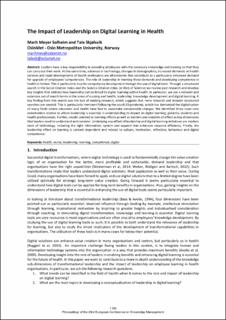The Impact of Leadership on Digital Learning in Health
Peer reviewed, Journal article
Published version
Permanent lenke
https://hdl.handle.net/11250/3052820Utgivelsesdato
2022-08-25Metadata
Vis full innførselSamlinger
- Publikasjoner fra Cristin [3269]
- SPS - Documents [424]
- TKD - Institutt for informasjonsteknologi [945]
Originalversjon
Proceedings of the European Conference on Knowledge Management. 2022, 23 (2), 1106-1114. doi.org/10.34190/eckm.23.2.648https://doi.org/10.34190/eckm.23.2.648
Sammendrag
Leaders have a key responsibility in providing employees with the necessary knowledge and training so that they can carry out their work. At the same time, advances in technology, changes in demographics, increased demands on health services and rapid developments of health professions are all elements that contribute to a particularly enhanced demand for upgrade of employees' competences. The role of leadership in meeting these demands and developing competence in health is limited. This is particularly true for competence development through the use of digital tools. Through a structured search in the Social Citation Index and the Science Citation index (in Web of Science) we review past research and develop key insights that address how leadership can be linked to digital learning within health. In particular, we use a relevant and extensive set of search terms in the areas of nursing and health, leadership, knowledge development and digital learning. A key finding from this search was the lack of existing research, which suggests that more research and broader structured searches are needed. This is particularly imminent following the covid-19 pandemic, which has demanded the digitalisationof many fields where education and health have had to undertake considerable changes. We identified three main core stakeholders relative to whom leadership is essential in understanding its impact on digital learning: patients, students and health professionals. Further, results pointed to learning effects as well as barriers and enablers of effect as key dimensions that leaders need to understand and consider. Underlying any effect of leadership and digital learning initiatives are modern tools of technology, including the right information, system and support that enhances resource efficiency. Finally, the leadership effect on learning is context dependent and related to culture, motivation, reflection, behaviour and digital competence.

